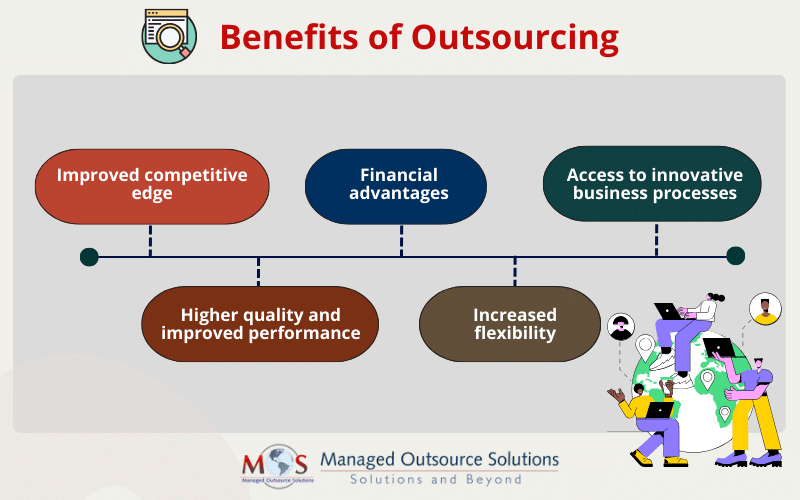We have all heard about enterprises delegating their operations to a professional business process outsourcing company. Outsourcing is regarded as a strategic move that allows businesses to focus on their core functions and improve productivity.
Understanding the Significance of Business Process Outsourcing
Business process outsourcing, which comprises outsourcing key functions can give numerous benefits to business owners. Outsourcing complicated operations such as human resources, customer service, IT, accounting, and payroll management can minimize overhead costs that would otherwise be too expensive for some businesses, particularly those with limited funds. Although BPO needs an initial investment, it is a popular alternative with a growing market.
According to a report by Statista, the key findings are:
- Revenue in the Business Process Outsourcing industry is expected to reach US$134.30 billion by 2024.
- Revenue is predicted to grow at a 3.23% annual rate (CAGR 2024-2028), with a market volume of US$152.50 billion by 2028.
- The average spend per employee in the business Process Outsourcing industry is expected to be US$0.79k in 2024.
- In global comparison, the United States will create the most income (US$134.30 billion in 2024).
Enterprise executives choose to outsource a business process for a number of factors, including the nature, age, and size of the firm, as well as market forces and economic conditions. There is no need to invest in expensive software or hire expert employees. BPOs resolve company challenges using expert workers and cutting-edge methodologies and technologies. BPOs help firms reduce work management by outsourcing the majority of processes. The complexity of managing work and other activities is minimized. With many activities outsourced, it also becomes easier to handle the competitors. Businesses can focus on growth rather than tasks. Internal resources are properly handled to plan new business-improvement plans. BPOs assist finish tasks rapidly, allowing businesses to compete more effectively.
However, many business owners are confused whether outsourcing critical procedures makes sense for their organization. There are various aspects to consider, including the industry, the amount of people, and the business’ key functions. Each business owner must determine if the potential benefits outweigh the risks of outsourcing.
If you are thinking about outsourcing some or all of your company processes, here are some of the benefit that you must know:
- Improved competitive edge: BPO allows an organization to devote more of its resources to operations that set it apart in the marketplace.
- Higher quality and improved performance: Since business processes are their primary focus, BPO providers are well positioned to accomplish work with higher accuracy, efficiency, and speed.
- Financial advantages: BPO providers can frequently do a business activity for a reduced cost or save the company money in other ways, such as tax savings.
- Increased flexibility: BPO contracts can provide the flexibility to change how an outsourced business process is carried out, allowing businesses to respond more quickly to changing market conditions.
- Access to innovative business processes: BPO providers are very much aware of the improvements in the process areas in which they specialize. This means that they are more inclined to invest in new technologies like automation, which can enhance work speed, cost, and quality.
What to Consider When Outsourcing
The decision whether to outsource is a very important one. You need to consider whether your business can benefit from additional external expertise, and whether there are processes that require more streamlining and are better handled by an external agency. Tips from outsourcing experts are always helpful when you are considering the outsourcing model for your business.
The following are 4 tips for outsourcing
- Decide what to outsource: Identifying all the activities that need to be outsourced is important especially for start-ups, to reduce unnecessary expenses. Find out the critical activities of your business and the tasks that you are good at. The remaining tasks or any repetitive tasks can be outsourced to a reliable service provider.
- Do not outsource your responsibilities: You cannot sit carelessly after outsourcing all the activities of your business. Neglecting responsibility can lead to the downfall of the business. It is important to the outsourcing vendor regularly to avoid issues along the way. Consider outsourcing as a fertile way to learn new skills that your business lacks.
- Understand the nature of your work: If your requirements are unpredictable, then outsourcing could be the right choice. It provides an external input to meet the needs of your business. Avoid vagueness and make sure that scope is defined and limitations are identified. Implement measures, controls and penalties and keep an alternative ready in case of emergencies.
- Clear documentation of IP ownership: It clearly shows who owns what from the beginning of the outsourcing contract, and who will own anything that is created. Find out whether your outsourcing company is bringing, or building their own IP. Also consider when and how the IP ownership will be transferred back to you. A clear understanding of IP ownership helps in building up a good relationship with the vendor. It also shows that you respect your outsourcing partner’s expertise. Clarity of IP ownership is important because investors will want to know comprehensive details regarding the same. So, make sure that you have clearly drawn-up outsourcing contracts that they can scrutinize.
Let us look at some other major considerations when outsourcing.
- Do not stick to one provider, interview multiple service providers: There may be vendors who offer service for very cheap rates. It is better not to go for such services because there may be some catch involved that could prove detrimental to your organization in the long run. Consider all service providers and their quotes. A low estimate may indicate that the outsourcing firm does not understand your business requirements or is a provider of low-skilled professionals. So, be careful when choosing a vendor.
- Look for references: Make sure to browse all sources such as Yelp, the Better Business Bureau etc and get recommendations from business associates. Ask questions like “How long have you used the outsourced firm”, “What are the services they provide”, “Have you faced any issues with the outsourced firm” and such other relevant queries.
- Avoid any misunderstandings: Before outsourcing make sure that you are clear about all your objectives and budget, and ensure proper communication with your vendor to avoid any dispute.
- Make sure that your goals are met: As the business expands, you may require more outsourced services when your in-house staff needs to focus on more core activities. Then, it becomes necessary to choose a vendor who can be a permanent asset.
Is your HR department struggling?
Read our blog to know
How Can HR Outsourcing Support Businesses?
Investing in professional outsourced solutions helps businesses to boost productivity and efficiency. However, embracing the outsourcing model could prove challenging. The most important thing is to appraise your business objectively and identify its current capabilities. Be practical and think long-term because you need to have a clear outlook on how business expansion will affect your functional capacity in the long term.
Begin your outsourcing process successfully.





